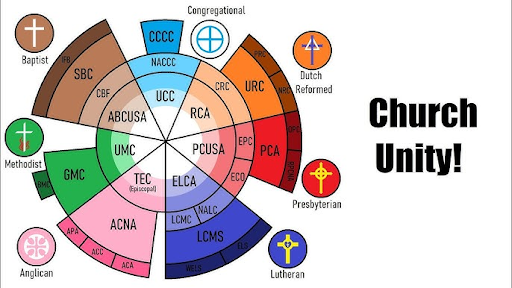Major Christian Denominations
Roman Catholicism
Beliefs:
The Pope, based in Rome, is the supreme spiritual leader and the successor of Saint Peter.
Emphasis on tradition, Scripture, and the Magisterium (teaching authority of the Church).
Belief in seven sacraments: Baptism, Eucharist, Confirmation, Reconciliation, Anointing of the Sick, Holy Orders, and Matrimony.
Veneration of Mary and the saints.
Purgatory as a place of purification before entering heaven.
Bible:
Uses the Catholic Bible, which includes the Deuterocanonical books such as Tobit, Judith, Wisdom, Sirach, Baruch, and Maccabees, which are not found in Protestant Bibles.
Traditions:
Liturgical worship, Mass, and the use of icons, statues, and rituals.
Eastern Orthodoxy
Beliefs:
No central papal authority; instead, it is organized into autocephalous (self-governing) churches led by patriarchs or bishops.
Emphasis on the mystery of God and theosis (becoming like God through grace).
Veneration of icons and saints.
Rejects the Catholic concept of purgatory but prays for the dead.
Bible:
Similar to the Catholic Bible but with slight variations in the Old Testament canon, including books such as Maccabees and Psalm 151.
Traditions:
Highly liturgical worship with rich symbolism, use of incense, and chanting.
Protestantism
Protestantism emerged during the Reformation in the 16th century, led by figures like Martin Luther, John Calvin, and others. It encompasses many denominations, but some core beliefs include:
Sola Scriptura: Scripture alone is the ultimate authority (vs. tradition in Catholicism).
Sola Fide: Salvation by faith alone, not by works.
Priesthood of all believers: All Christians have direct access to God without needing a priestly mediator.
Major Protestant Denominations
Lutheranism
Founded by Martin Luther.
Emphasizes grace and faith for salvation.
Recognizes two sacraments: Baptism and Eucharist (with belief in the real presence of Christ in the Eucharist).
Calvinism/Reformed
Founded by John Calvin.
Emphasizes predestination and God's sovereignty.
Includes Presbyterians, Reformed churches, and the Dutch Reformed Church.
Anglicanism/Episcopalianism
Originated in England under King Henry VIII.
A "middle way" between Catholicism and Protestantism.
Uses the Book of Common Prayer and maintains some liturgical traditions.
Baptists
Emphasizes believer's baptism (not infant baptism) and congregational governance.
Strong focus on individual faith and evangelism.
Includes Southern Baptists, American Baptists, and Independent Baptists.
Methodism
Founded by John Wesley.
Emphasizes personal holiness, social justice, and the possibility of perfection in love.
Includes the United Methodist Church, the Free Methodist Church, and the Wesleyan Church.
Pentecostalism/Charismatic
Emphasizes the gifts of the Holy Spirit, such as speaking in tongues, prophecy, and healing.
Highly experiential and emotional worship.
Includes the Assemblies of God, Church of God in Christ, and the Foursquare Church.
Non-Trinitarian Groups
These groups reject the traditional doctrine of the Trinity and have distinct beliefs.
Jehovah's Witnesses
Believe Jesus is the Son of God but not equal to God the Father.
Reject the Trinity, hellfire, and the immortality of the soul.
Use their own translation of the Bible (New World Translation).
Mormonism (The Church of Jesus Christ of Latter-day Saints)
Believe in additional scriptures (Book of Mormon, Doctrine and Covenants, and Pearl of Great Price).
Teach that God, Jesus, and the Holy Spirit are separate beings.
Emphasize modern prophets and temple rituals.
Other Groups
Seventh-day Adventists
Observe the Sabbath on Saturday.
Emphasize the Second Coming of Christ and healthful living.
Founded by Ellen G. White.
Quakers (Religious Society of Friends)
Emphasize direct experience of God and simplicity in worship.
No formal clergy or sacraments.
Promote pacifism and social justice.
Key Differences in Beliefs and Practices
Authority: Catholics and Orthodox emphasize tradition and church authority, while Protestants focus on Scripture alone.
Salvation: Catholics and Orthodox believe in faith and works, while Protestants emphasize faith alone.
Worship Style: Ranges from highly liturgical (Catholic, Orthodox) to informal (evangelical, Pentecostal).
Sacraments: Catholics and Orthodox have seven sacraments; most Protestants recognize only two (Baptism and Communion).
Church Governance: Varies from hierarchical (Catholic, Orthodox) to congregational (Baptists, Pentecostals).
Conclusion
Christian denominations reflect a rich tapestry of beliefs and practices, all rooted in the life and teachings of Jesus Christ. While they differ in theology and tradition, many share a common commitment to spreading the Gospel and serving others. Understanding these differences can foster greater respect and dialogue among Christians worldwide.




.jpg)


No comments:
Post a Comment